Powerful conversations on loneliness, learning from innovative volunteer involving organisations, and presenting new work at a conference
Loneliness and Connection in Zagreb
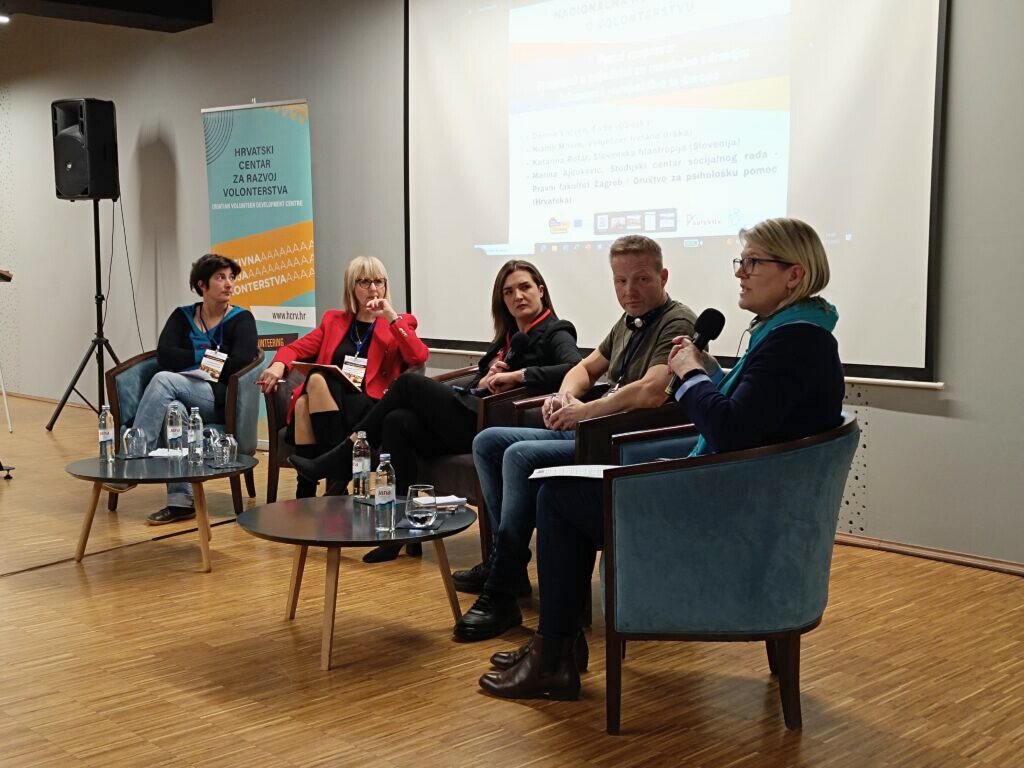

Powerful conversations on loneliness, learning from innovative volunteer involving organisations, and presenting new work at a conference
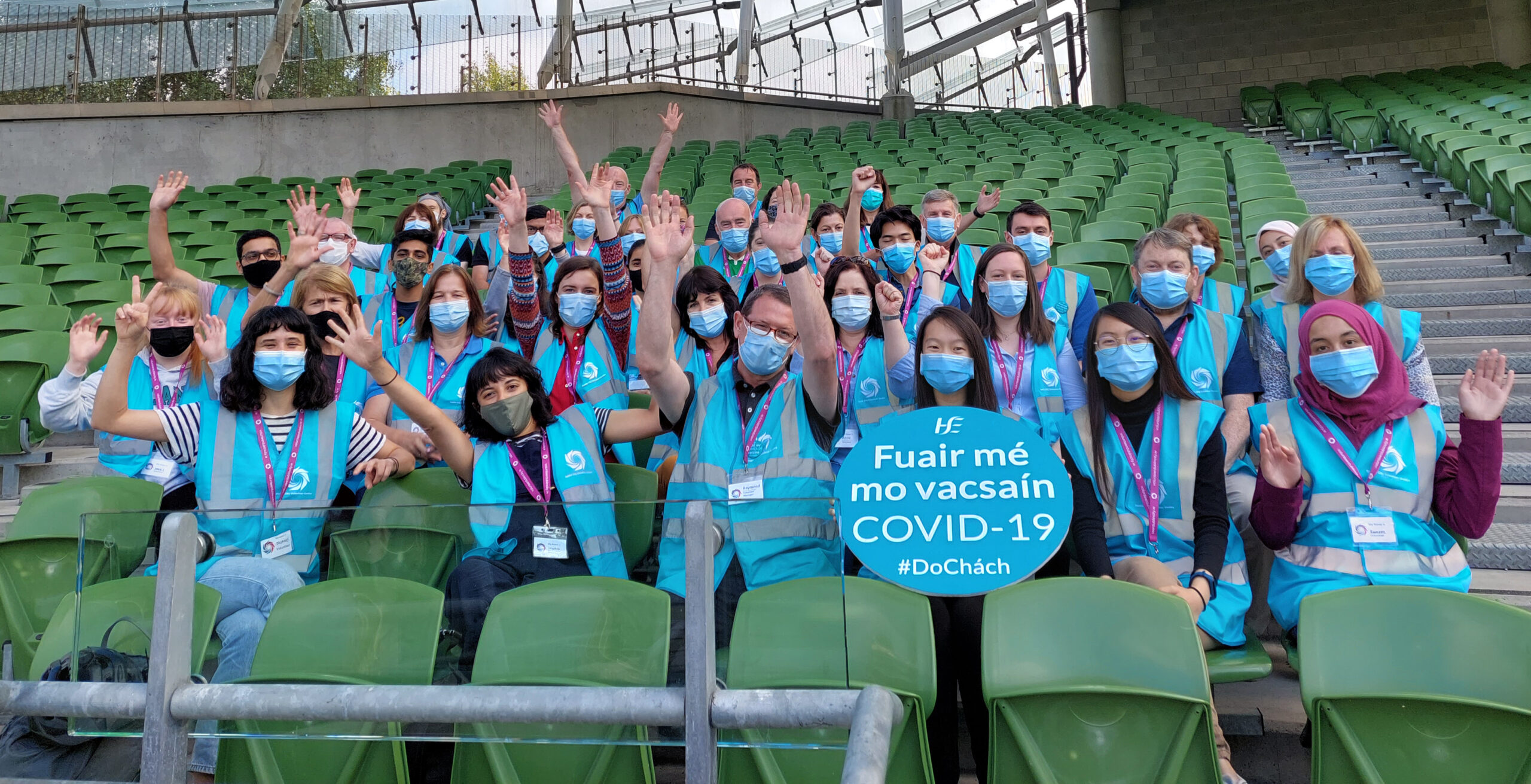
A look at what’s happened in volunteering during 2020-2021 and the impact it’s had on volunteer engagement today. By Stuart Garland, Learning and Capacity Building Manager at Volunteer Ireland.

An International Volunteer Managers’ Day update from Stuart Garland, Volunteer Ireland’s Learning & Capacity Building Manager.
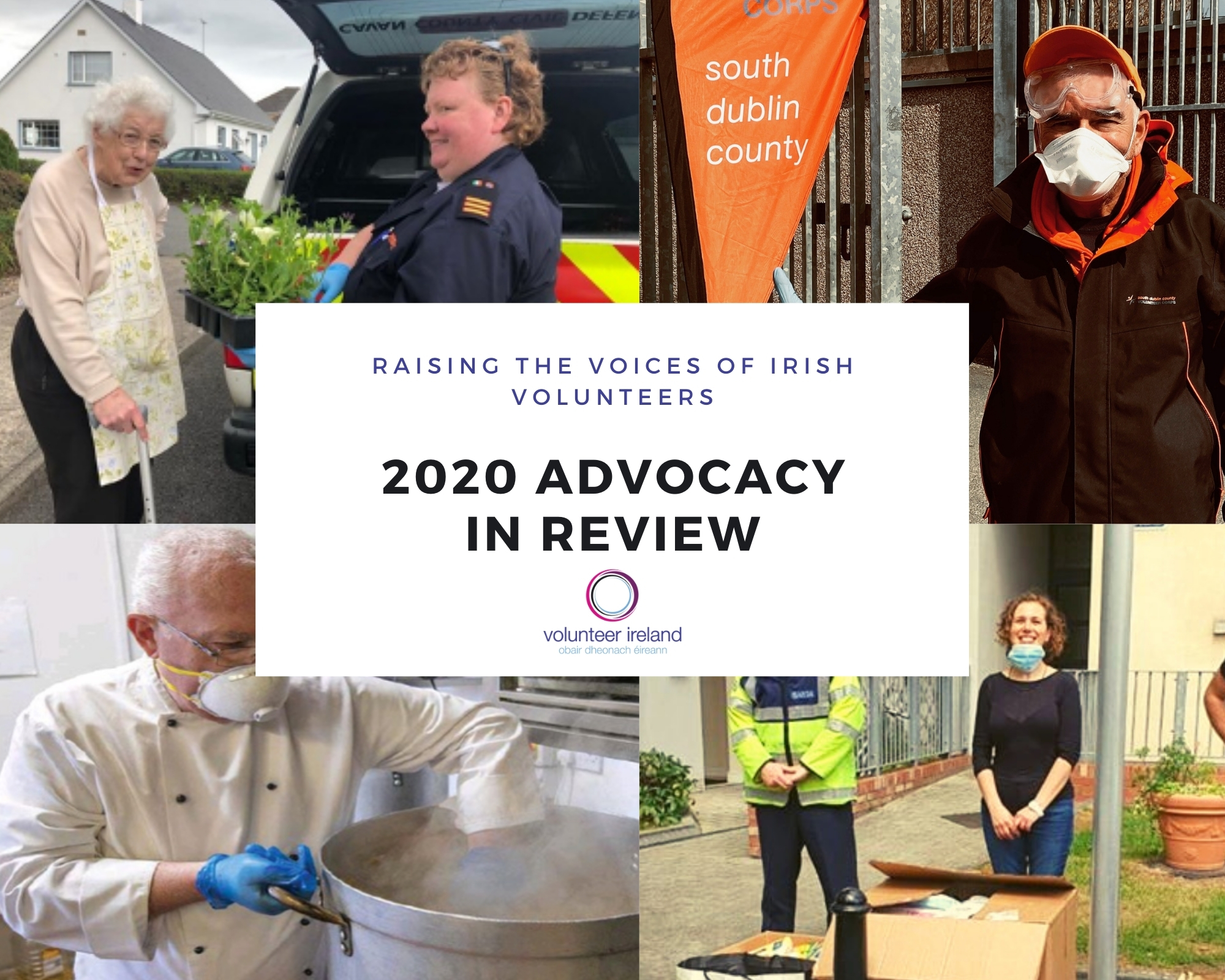
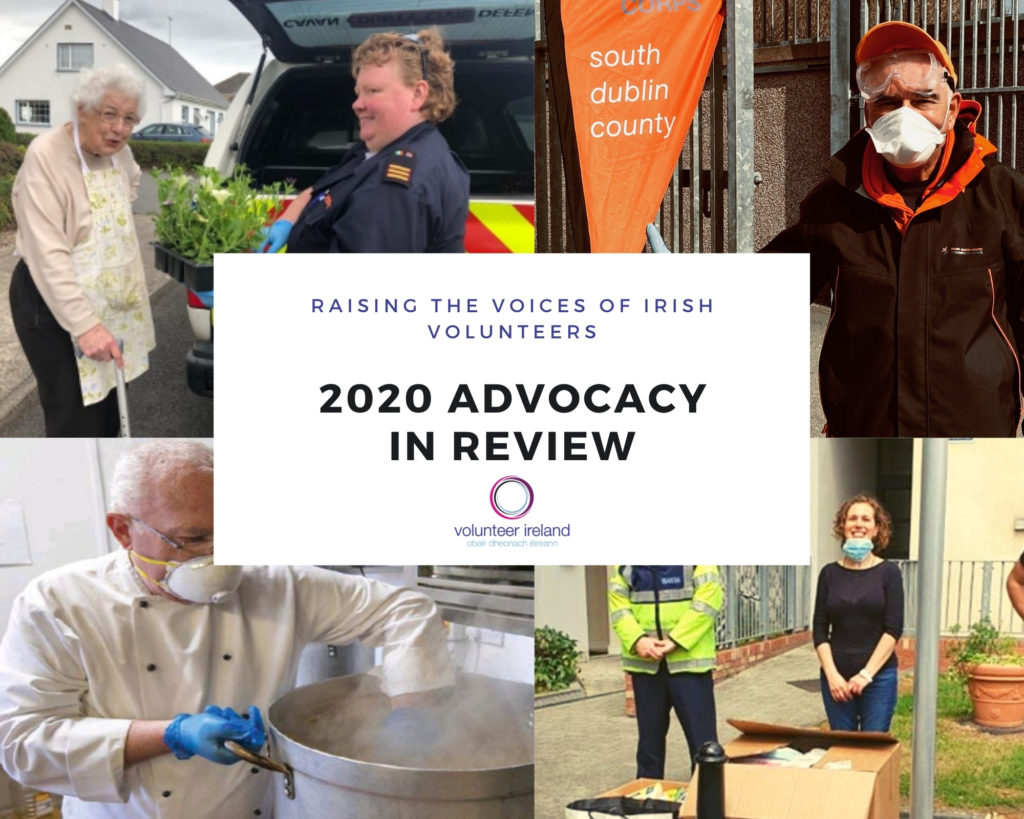

Ireland’s Public Affairs Officer, Heber Rowan, takes a look back at the last year and how our advocacy efforts strengthened and evolved throughout the year.
2020 was a year unlike any other. It was a year that showed the value of volunteering to Irish society and how important our work is for volunteers and organisations that involve volunteers.
With the COVID-19 restrictions in place, Volunteer Centres supported frontline efforts to combat COVID-19 as part of the Community Call initiative.
The pandemic’s restrictions on Irish society resulted in a huge upswelling of public support for volunteering with almost 23,000 people signing up to the national volunteering database I-VOL for COVID-19 related roles since March.

Like everyone, with the onset of the COVID-19 restrictions we had to make changes to the way we worked and how we continued to deliver on our advocacy objectives.
With the conclusion of the February 2020 general election leading to a coalition government in June, we were delighted to welcome the appointment of the first ever Minister of State for Community Development and Charities, Joe O’Brien TD.
With the COVID-19 restrictions having a massive impact on the fundraising efforts of Irish charities and community groups, we supported the efforts of the Wheel, the Charities Institute and others to advocate for a stability fund. This fund was a welcome relief to many volunteer involving organisations facing difficult times.
To highlight the range of personal stories involved in the COVID-19 response we developed a collection of stories, “How Irish communities stepped up to the mark – Stories of Irish Volunteering during COVID-19“. Working with the network of Volunteer Centres, we highlighted inspiring stories of the breadth and diversity of volunteering in the midst of the summer lockdown. It was also distributed to a range of public representatives to highlight the work and also to provide a longer term record of the change that occurred in Irish volunteering this year. 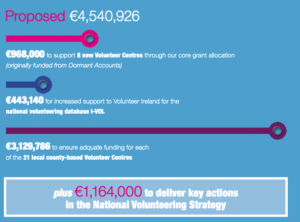
Additionally, we launched our pre–budget submission which requested appropriate funding for the national volunteering strategy, I-VOL, eight new volunteer centres nationally and an overall request for 10% extra funding for the network of Volunteer Centres. To drive this forward, we lobbied a range of government and opposition spokespeople to consolidate our message and highlight our concerns for the sector as a whole.
This year we were unable to undertake our normal in person meeting with Oireachtas members broadly though we were glad to get a virtual meeting with Minister Joe O’Brien. It was wonderful to have the Minister’s support and understanding of our work throughout our conversations.
In Budget 2021, an increase of 45% from €3.5 million to €5.1 million was allocated towards supporting the voluntary sector.
In October, the Department of Rural and Community development published its call for its statement of strategy and we presented our views on behalf of the sector.
 Crucially, the Department published the first ever National Volunteering Strategy in December after extensive public consultations. Volunteer Ireland and the network of Volunteer Centres have been advocating for a national volunteering strategy for many years. We are delighted to have played an important role in its development and look forward to seeing the exciting new initiatives contained within to diversify, strengthen and broaden the scope of volunteering across Ireland.
Crucially, the Department published the first ever National Volunteering Strategy in December after extensive public consultations. Volunteer Ireland and the network of Volunteer Centres have been advocating for a national volunteering strategy for many years. We are delighted to have played an important role in its development and look forward to seeing the exciting new initiatives contained within to diversify, strengthen and broaden the scope of volunteering across Ireland.
We learned that even in the most extraordinary of circumstances, communities will continue to help those in need. It reminded us of the necessity to take a dynamic and creative approach to supporting volunteers. With the new national volunteering strategy in place, we relish the opportunities ahead to do just that.
With seven new Volunteer Centres opening in 2021, we intend to support their advocacy efforts by providing a range of training and materials for them. We will continue to support the network of Volunteer Centres with an updated advocacy resource toolkit.
With the many deliverables ahead of us from the national volunteering strategy we have our work cut out for us and we’re very much looking forward to it! Thank you for your support this year and next.

 Martin J Cowling is a knowledgeable and popular international trainer based in Canberra, Australia. He possesses over 20 years of management experience with organizations including UNICEF, AFS Intercultural Programs, The Smith Family, and Victorian Relief. Today he gives is the five actions volunteer managers need to do right now.
Martin J Cowling is a knowledgeable and popular international trainer based in Canberra, Australia. He possesses over 20 years of management experience with organizations including UNICEF, AFS Intercultural Programs, The Smith Family, and Victorian Relief. Today he gives is the five actions volunteer managers need to do right now.
Today, as one of the members of our household took out the recycling, one of the glass bottles slipped from their grip and hit the tiled floor shattering and sending shards everywhere. There are now tiny glass segments scattered across five metres. After many minutes of sweeping, it is still risky to walk barefoot in that area. For many of us, 2020 has been like this. Everything we have been used to, has been shattered and we are living with trying to reorder the world and avoid getting cut by a shattered piece.
Through volunteering, people have always been helping fixed shattered lives, shattered individuals and shattered communities. From Food Banks to animal rescue organisations to Civil Defence to literacy to Samaritans, volunteers have always faced fractured situations and provided advice, support, clean up and repair. In this current crisis, many volunteers continue to serve in some way.
Managers of volunteers have always had multi functional roles. Through COVID-19, this role has to shift into a new space, whether our volunteers are mobilised or furloughed. COVID-19 is proving to be a test case for effective leadership as managers of volunteers shine by leading in new ways.
There are five actions for volunteer managers:
1. Look after yourself. Acknowledge that this is not normal and that we may never see the same world again. I have been scheduling 2 to 3 virtual face time or zoom coffees a week with inspiring people I respect.
2. Develop a clear, hierarchical list of priorities for your organisation, yourself and your volunteers. Focus on what is really important right now. You could not do everything before the virus emerged and you cannot do it now. What will most make a difference?
3. Communicate calmly, honestly and be empathetic to your volunteers and clients. It is very rare for people to over communicate in a crisis. Say the same thing in different ways repeatedly. Remind volunteers that they are important, give them affirmations and statements about what the organisation and volunteers are doing.
4. Encourage innovation to deliver crucial services. This will be the time people will learn to Skype, to face time. Volunteers can do many things from their homes using phones, computers and even drones. Let them suggest new ways to do their work.
5. Write down and document your stories and learnings from this.
We cannot fix that shattered bottle but our actions can help us live through the shattering.
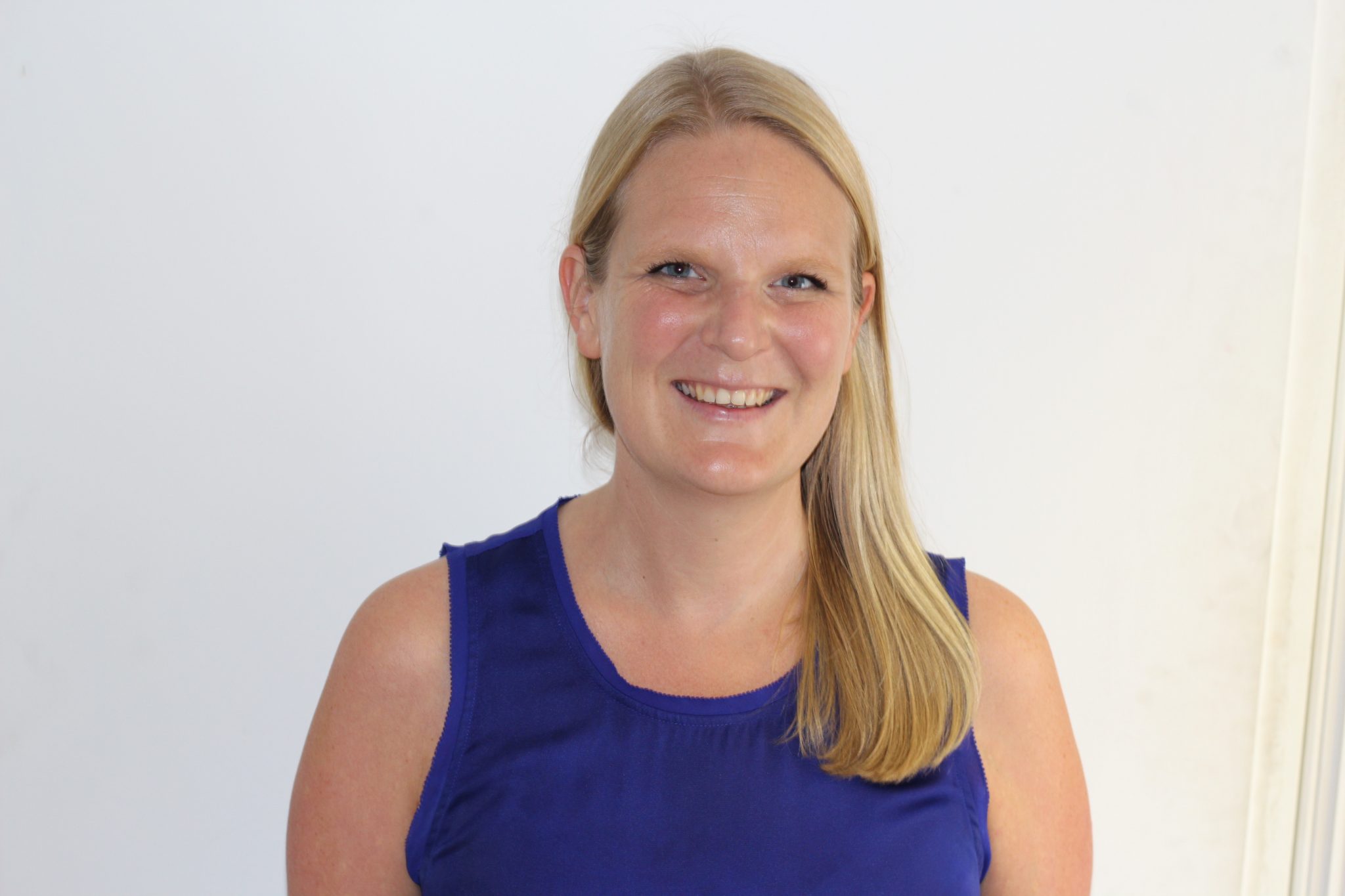
 Volunteer Ireland CEO Nina Arwitz takes a look at the numbers around COVID-19 and examines a phenomenon seen in Ireland and many countries around the world – that there are more people signing up to volunteer than there are available volunteer roles.
Volunteer Ireland CEO Nina Arwitz takes a look at the numbers around COVID-19 and examines a phenomenon seen in Ireland and many countries around the world – that there are more people signing up to volunteer than there are available volunteer roles.
We have seen a huge outpouring of support from people across Ireland wanting to offer their help to others in response to COVID-19. Thousands of people have signed up to the national volunteering database, I-VOL, over the last 2 months. Given the large number of people willing to volunteer we haven’t been able to find a role for everyone and that can understandably cause frustration. People want to help but sometimes there is nothing for them to do. But why is that?
The main reason is actually a pretty great one. Ireland already has a really strong culture of volunteerism. On average, over 1 million people in Ireland volunteer their time for others each year. We’re in the top 10 in the world for volunteering! This means that a lot of organisations already have a full complement of volunteers and were able to respond to COVID-19 immediately. This is really good news for our communities and our most vulnerable friends and neighbours.
Along with us, the network of Volunteer Centres and Volunteering Information Services, work with organisations and volunteers all year round – supporting them, advising them and matching them. Thanks to this vital service, many organisations had an existing support system in place.
Unfortunately, the onset of COVID-19 meant that many organisations had to suspend their services until restrictions are lifted meaning that the requirement for volunteers has been much lower than normal. It’s important to remember that as we move to the ‘new normal’, many organisations will once again be in need of volunteers to support their services, which will be in demand more than ever.
One piece of comfort is that we are not alone. Having spoken to colleagues across Europe and as far off as North and South America, Asia, Australia and New Zealand – they are all in the same boat: more people want to volunteer than are needed right now. While it can be very frustrating if you want to volunteer and there is no role for you, it’s good to remember that this is actually a positive thing – that so many people are willing to help!
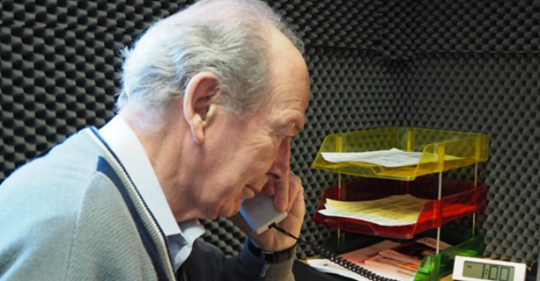
 Damian Leneghan is the Programme Manager with SeniorLine, a confidential listening service for older people provided by trained older volunteers. Here he tells us how COVID-19 has affected their service and how they have adapted their volunteer programme.
Damian Leneghan is the Programme Manager with SeniorLine, a confidential listening service for older people provided by trained older volunteers. Here he tells us how COVID-19 has affected their service and how they have adapted their volunteer programme.
Tell us a little bit about SeniorLine and how you engage volunteers generally.
Usually we have 178 SeniorLine volunteers, all older people themselves, who answer the support line in 3 hours shifts in one of our 3 Dublin locations. They answer calls from older people on a range of issues including: loneliness, bereavement, suicide, elder abuse and family conflict among other things. Each volunteer does one shift every 3 weeks and always work in pairs meaning that 2 volunteers are on duty at each centre at any time. Volunteers received 5 days of intensive training, have support materials with them on shift and always have the ongoing support of SeniorLine staff.
How has COVID-19 affected how you manage your volunteer programme?
The biggest impact on our programme has been the need for all of our volunteers to do their shifts from home. Luckily, we already had a ‘work from home’ system in place for holiday periods which allows us to use a platform to redirect calls to volunteers at home. Now we have had to move to using this system full time until we get back to normality. We offered the option to all of our volunteers and 109 of them signed up to volunteer from home. This has been brilliant as it means we can still deliver our service but it does involve more work and higher costs on our side.
Volunteers working from home naturally require more support. Volunteers now receive updates twice daily from the Programme Manager via text. It means we can provide that extra support and keep the lines of communication open, although the use of a bulk testing service has increased costs considerably.
How have your volunteers handled the change?
One of the biggest changes from the volunteers’ perspective has been the loss of the social side of volunteering and the support that volunteers provide each other. However, all of our older volunteers have been amazing! Although some were apprehensive and there were a few tech teething errors, everything has been running relatively smoothly. We call each volunteer after their shift which gives them great support – according to them! Our volunteers are themselves older people – the vulnerable group, cocooning, having shopping delivered to their homes, isolated and so on– and yet they are offering their time and experience to their peers – it’s great!
What advice would you give a volunteer manager who has never engaged volunteers virtually/from home?
The most important thing to remember is to keep connected. Give volunteers extra support, call them after their shift, have regular check ins. Never assume all is ok – always ask how they are. It’s also vital make sure volunteers are very clear about their boundaries when at home – their safety and security is priority. And as always, preparation is key. Do a risk assessment and identify how volunteering from home is different than in an office and make it as supported an environment as possible.

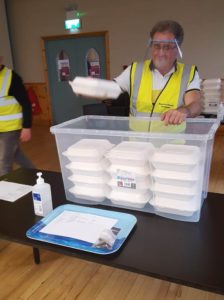 Russell Bevan is the Secretary of, Farranree Community Association, a small charity on the North side of Cork City that provides the Meals on Wheels service to the elderly and vulnerable in the local and surrounding areas. He tells us how the coronavirus has affected their services and how they have coped.
Russell Bevan is the Secretary of, Farranree Community Association, a small charity on the North side of Cork City that provides the Meals on Wheels service to the elderly and vulnerable in the local and surrounding areas. He tells us how the coronavirus has affected their services and how they have coped.
We have been operating for many years and have had to rely on a small band of very loyal volunteers, 5 in number, for the most part, to ensure that the service is maintained. Prior to the outbreak of the coronavirus we used to provide on average 60 hot meals four days a week that were prepared and cooked in the Community Centre that we worked out of by two staff members.
Then along comes coronavirus to cause chaos and force us into alterations that we could never have envisaged, we could no longer all get together, we could no longer use stainless steel dishes to transport the meals, we could no longer cross the threshold into the recipients’ residence, we could no longer do any small tasks for them.
It has caused a lot of upheaval but with the right people and a can do attitude, we have managed to continue running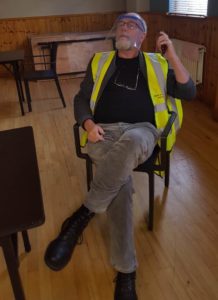 the service without any interruption to our normal timetable.
the service without any interruption to our normal timetable.
Admittedly, administratively it has been a massive task to implement almost overnight but we have managed it by introducing signage all through the Centre instructing staff and volunteers of the procedures they now have to adhere to so that social distancing can be maintained at all times.
Whilst COVID-19 has been devastating for so many, from our own point of view it has brought both negatives and positives.
The positives are less washing up and more importantly the huge increase in the number of volunteers we now have registered with us, which has gone from 5 to 24 since we registered with the Cork Volunteer Centre, whilst administratively it can be time consuming and cause headaches trying not to omit anyone from the schedule, it is a very nice problem to have, in comparison to begging your wife and two gentlemen of advanced years to keep helping you out week in week out.
With the addition of so many volunteers it has allowed three of our regular drivers to cocoon, which they were loathed to do until they knew that we would be able to continue the service, if our new volunteers prove to be of the same ilk and the signs so far are good we will have no problems running the service for as long as it is required. Interestingly over 80% of our new volunteers are tender in years, which offers great hope that going forward the country and charities in particular, will be in safe hands for many years to come.
 It is to be hoped that most if not all of those who have recently volunteered will stay with us after this crisis ends, obviously only time will tell, but if they follow the lead of two of our volunteers, one who insisted on driving to the City from Bantry recently to fulfil the commitment she had made to us and another who has made his own partition screen for his car so that he could volunteer, I am confident that the future will be bright for us all.
It is to be hoped that most if not all of those who have recently volunteered will stay with us after this crisis ends, obviously only time will tell, but if they follow the lead of two of our volunteers, one who insisted on driving to the City from Bantry recently to fulfil the commitment she had made to us and another who has made his own partition screen for his car so that he could volunteer, I am confident that the future will be bright for us all.

Emma Barnes is the Training and Recruitment Manager with Aware, a national charity that provides support and education for those experiencing low mood, anxiety, depression or bipolar disorder. Here she tells us about managing a team of volunteers across four services and how they have adapted to COVID-19.
Tell us a little bit about Aware and how you engage volunteers generally.
Aware is a national charity that supports people experiencing low mood, anxiety, depression or bipolar disorder. We have four services supported by volunteers; a support line, local support groups, a support email, and the Life Skills Online programme. The latter two services are delivered virtually by volunteers although in person training still takes place before volunteers take up their role. The support helpline is delivered from our offices in Dublin 4 while local support groups take place around the country.
How have you adapted your volunteer programme since the onset of COVID-19?
We were actually in the middle of training a new intake of volunteers for our Life Skills Online programme and our support helpline when the restrictions began. We had to adapt very quickly and within days we had moved the training online. As we had a big group of volunteers, we split them into smaller groups of 10/15 volunteers and completed the training through Zoom. We are lucky that given the nature of our roles, our volunteers are quite tech savvy so most of them adapted quite quickly.
We have changed the helpline to work through an app on volunteers’ mobile phones – all secure and encrypted – so they can take calls during their shift while at home. We have made the importance of shifts very clear – if a volunteer is on for a three hour shift then they finish when the three hours is up. When you’re fulfilling your role at home, the lines between ‘on’ and ‘off’ can become blurred so we have been very clear about maintaing boundaries.
Have you faced any challenges adapting your volunteer programme?
For some volunteers, particularly those who don’t typically deliver our online services, technology has been a challenge. In these cases, we offered extra support to help the transition but in some cases the volunteers felt it was best to wait until things are back to normal to continue their role. This is completely fine and we have engaged these volunteers in other ways by asking them to spread the word about our services online and by word of mouth.
Another challenge has been to ensure we are looking after our volunteers’ mental health. As a society, we are all going through something quite difficult and unprecedented so it’s critical we are minding the mental health of our volunteers as well as our service users.
We have created a ‘buddy system’ whereby a more experienced volunteer will check in with a volunteer at the end of their shift to see how they are, how they got on and if there were any challenges. This is really important as one of the most enjoyable aspects of volunteering for many is the social side where they make connections with other people – this doesn’t replace that but ensures the volunteer feels supported and connected.
Do you have any advice for anyone trying to manage their volunteer programme remotely?
Communication is key. There are lots of different ways to engage volunteers remotely but it’s vital to be clear about what you’re asking them to do and how they’ll be supported throughout the process. Ensure they’re comfortable with change but if they’re not, make sure they know it’s ok to opt out. And that they there is a place for them when everything returns to normal.
Be clear about expectations and boundaries. Make sure volunteers don’t take on too much and encourage them to practice self care. This is a trying time for everyone and people are so willing to help in any way they can. As volunteer managers we have a really unique job in harnessing that spirit, engaging volunteers effectively and making sure they are supported.
If you’d like to volunteer with Aware, you can learn more here. If you’re looking for support from Aware, you can learn more here.
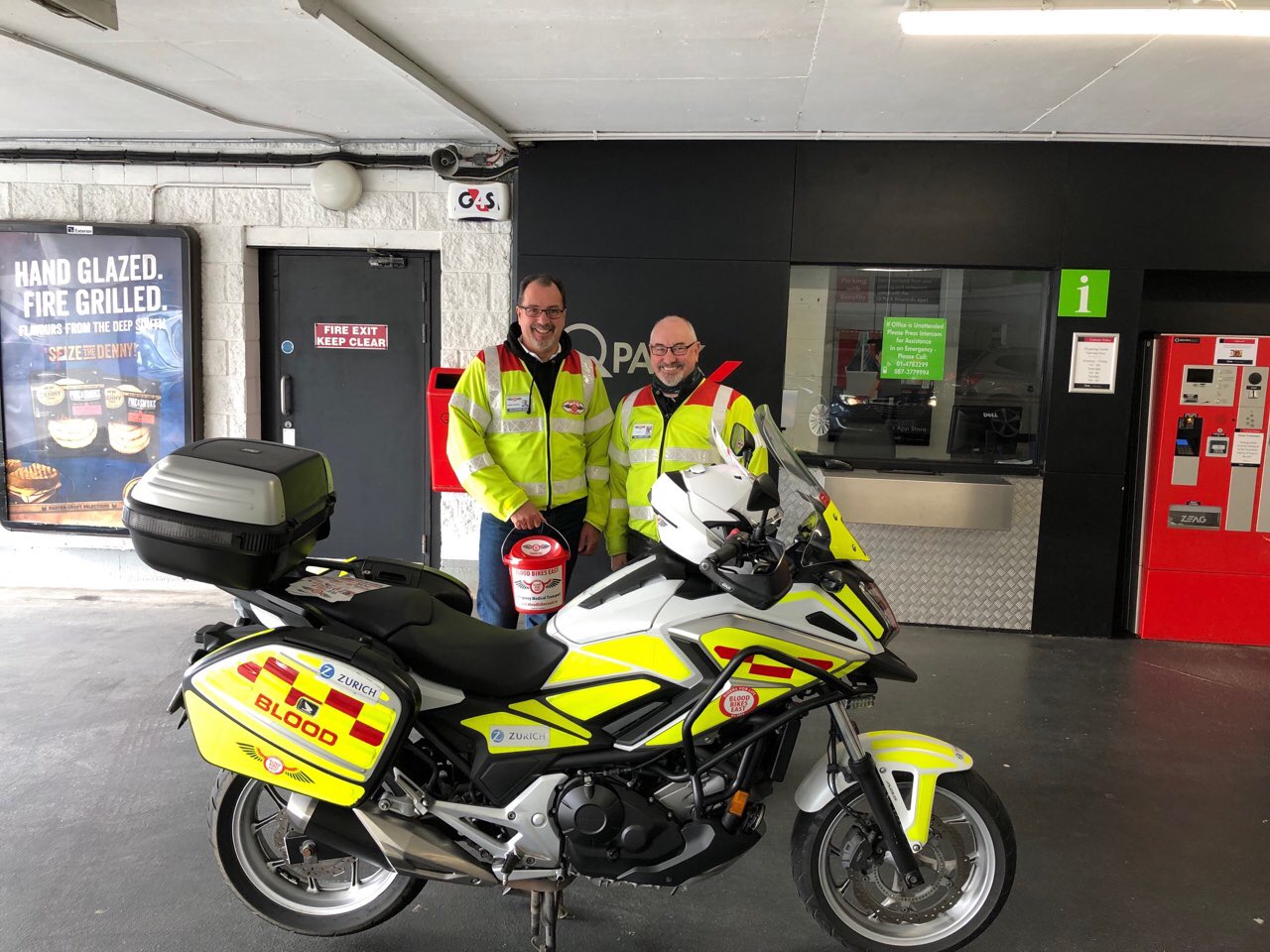
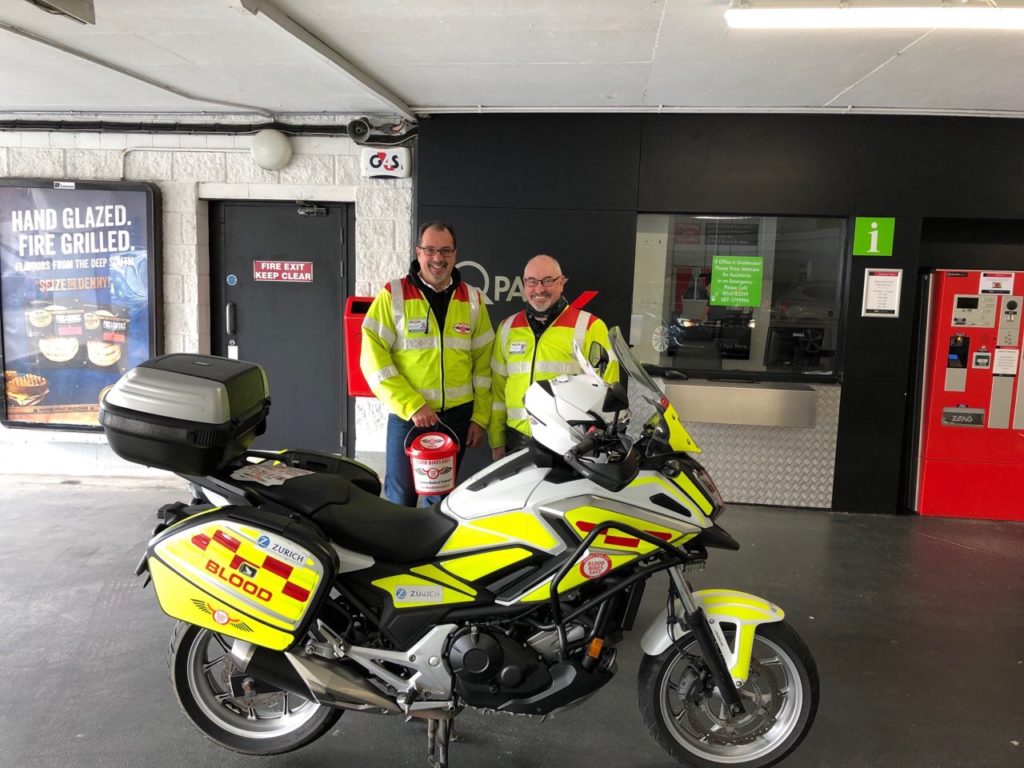

Aidan Collins, Communications Officer with Blood Bikes East tells us about the impact COVID-19 has had on their organisation. Established in 2012 Blood Bikes East is an Emergency Medical Transport Service. Staffed entirely by volunteers, they offer a free out of hours delivery service under SLA for 22 hospitals in the Greater Dublin area.
How has the COVID-19 emergency impacted Blood Bikes?
We have seen a big increase in demand for our services. Since the beginning of the year our cars have done over 35,000 miles – most of that in March. We have recently added an extra overnight shift to cope with the volumes of samples coming from the regional hospitals to the National Virus Lab in Dublin via linkups with the other Blood Bike groups.
We primarily run an out of hours service because all of our volunteers have day jobs but we have now added day shifts during this period providing support to Beaumont Hospital and St. Michael’s in Dun Laoghaire. We have also added an extra shift for a scheduled weekly collection – which often takes place in the middle of the night. Thankfully we have a wonderful group of trained volunteers and we have had no problems filling shifts!
Has COVID-19 impacted the organisation in any other way?
Our fundraising traditionally takes place through on street collections or bag packing in the supermarkets – two close contact activities that are off the table for the moment. We have moved our fundraising online by adding a button to our website and Facebook page. Our volunteers are also doing a great job raising money through their own social channels.
We are very lucky in Blood Bikes East to have the support of some great sponsors. Annesley Williams have given us a free 4×4 every year for the last 5 years while AXA Insurance covers the cost of insurance for our bikes. Maxol have recently come on board to cover the cost of petrol – our second highest overhead – for the duration of the emergency. Our other overheads continue to increase as the vehicles need an increased level of maintenance and parts due to the increased mileage so a regular income is more important than ever.
Have you needed to recruit more volunteers?
We have had over 90 requests from people looking to volunteer with us over the last few weeks which is great. Given we provide such in depth training for new volunteers, it hasn’t been possible to bring many new people on during this process. We’ve been lucky that we’ve had a few Garda bikers and motorbike instructors apply and have been able to take them on given they have advanced rider training already. We have invited anyone else who wants to volunteer to start their prep work for the advanced rider course which can take a lot of time so is perfect for this period. We’re sure a lot of our volunteers could use a break once this is over and we’re looking forward to welcoming new volunteers then.
And finally, as a busy volunteer with a family and full time job, how do you manage it all?!
I’m not going to lie – it has been fairly manic. Luckily my day job is a global role so I’m used to video conferencing and working odd hours so I’ve been able to share my expertise with the committee. I’m also lucky that we have such a great group of committed volunteers so I have been able to concentrate on communications and administration over the last few weeks and haven’t needed to take on a biking shift. Volunteering with Blood Bikes East, especially at a time like this, allows you to see the very best in people which has been such a positive during such a crazy time!